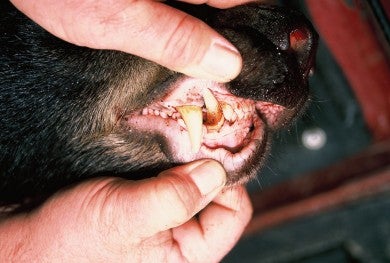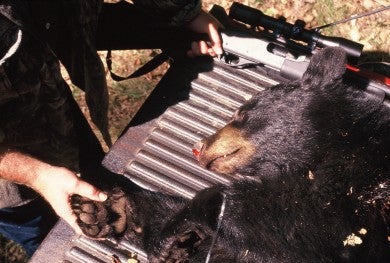Florida Black Bear Hunting: It’s About Time
Bob McNally 04.21.15

There’s a hot-topic black bear hunting controversy in paradise these days. That’s because Florida’s Fish and Wildlife Conservation Commission (FWC) recently voted unanimously to open the first bruin hunting season in the Sunshine State in 21 years.
If things go as planned and approved by the FWC, beginning next October Florida sportsmen will be allowed to harvest 100-pound minimum-weight bruins for a $100 license, with a harvest cap of about 200 bears allowed taken per year.
FWC biologists believe current state bear numbers are about 3,000, though in-the-know hunters believe that estimate is very conservative.
Florida closed traditional fall hunting for bears back in 1994, and since then the state population of bruins has bounced back so strong that human-bear conflicts have made news throughout much of the state. No less than four incidents of people being mauled by bears over the last couple years brought bear hunting back into the recent conservation discussion.
If the bear hunt takes place as approved, Florida would become the 33rd state in America allowing black bear hunting out of 41 states having such bruins.
This would be in spite of a well-organized, very vocal attempt by some people to halt the hunt, with groups such as the Human Society of the United States, Defenders of Wildlife, and the Sierra Club at the forefront.
Frankly, I’m amazed it took this long for black bears to become a recognized problem in Florida, where I’ve lived for 40 years. For over a decade, Florida bee keepers and hunters who place motion-activated game cameras near their forest deer feeders have known that the state bear population had grown to remarkable abundance. Rural bee keepers were constantly having hives destroyed by bears, and many deer hunters throughout the state were getting more photos of heavy black bears than of skinny whitetails.
Frankly, if Florida soccer moms knew how close their kids sometimes play to places black bears regularly roam, there would have been a huge outcry for state bear control long ago, or many newly-transplanted suburbanites would head back to Chicago, New York, Cleveland, and other native northern cities.
The northern half of Florida has a particularly high number of black bears living near large metro areas, including Jacksonville, Ocala, Orlando, and Tallahassee. I know this is true from game camera photos I regularly see and from solid reports from hunting buddies throughout the region.
One friend showed me remote camera photos not far from Jacksonville that proved three different mature black bears had visited a feeder near one of his deer stands in less than a week. There were more bears than deer at that site.
Another pal last fall on a bow deer stand near tourist-popular St. Augustine (the nation’s oldest city) watched a 250-pound bruin every time he hunted the spot–while listening to cars whistle along U.S. 1. Bears also prowl within a golf shot of the famed Players Championship Golf Tournament in tony Ponte Vedra Beach.
Still another bowman I know regularly watched a bear near posh Jacksonville suburbs, and the animal was close enough to a school that he could hear kids playing and yelling during recess.
Almost every river-based North Florida swamp at times has black bears, simply because such lowland areas off the St. Johns, St. Marys, Suwannee rivers, and many others (plus their large tributaries) have abundant terrain where few people tread. Such tangled riverine regions are habitat corridors that snake through and very close to houses and condos, shopping centers, busy roadways, apartment complexes, and youth soccer and football fields.
Water, mud, mosquitoes, poisonous snakes, and gators keep most people out of such places, but bears find river swamps just dandy.
Human-bear conflicts are especially likely in spring during bruin mating season, since males travel widely looking for love.
In recent years Floridians have been mauled by bears in their home neighborhoods, and as a result a number of bruins were permanently dispatched by FWC officers to rid some locales of troublesome bears with big teeth and heavy claws.
This was all very predictable, although not many people in wildlife bureaucracies or among the animal rights crowd were crowing much about it until recently. Once bears lose their fear of man, it’s survival of the fittest mammal, and no human can go toe-to-toe with a full-grown black bear, of course.
The trouble started in the mid-1990s when anti-hunting folks worked overtime to remove the Florida black bear from the lawful game list, which stopped sport hunting for the animals. Bears are in no way endangered nationally, but the Florida black bear was touted as a unique “race” of bruins, with a limited range and small population. There wasn’t much of a fight between the anti-hunters and the comparative handful of state bear hunters, so bears became protected under Florida law.
This whole procedure is pretty bizarre, considering bears are still hunted in neighboring Georgia, including South Georgia, where the difference between the Florida “race” and Georgia “race” of bears is all but negligible.
Interestingly, Georgia has almost no human trouble with bruins, at least compared to Florida, and Georgia has plenty of wild places and lots of people. But they also hunt bears enough to keep that animal population in check. That’s all it takes to put the fear of man back in black bear ranks and help keep them out of homeowner garages, garbage cans, and soccer fields.
This is all very much like alligator management, keeping in mind that gators (like Florida black bears) have limited distribution, since they don’t have such wild native reptiles in Detroit.
Not too many years ago Florida residents watched protected gators thrive, multiply, and lose their fear of man. That’s when plenty of poodles near golf course ponds started disappearing, and human-gator encounters increased, rarely ending well for people.
That’s the reason well-regulated Florida gator sport hunting resumed.
The time finally has come for that to happen with Florida black bears, too.

